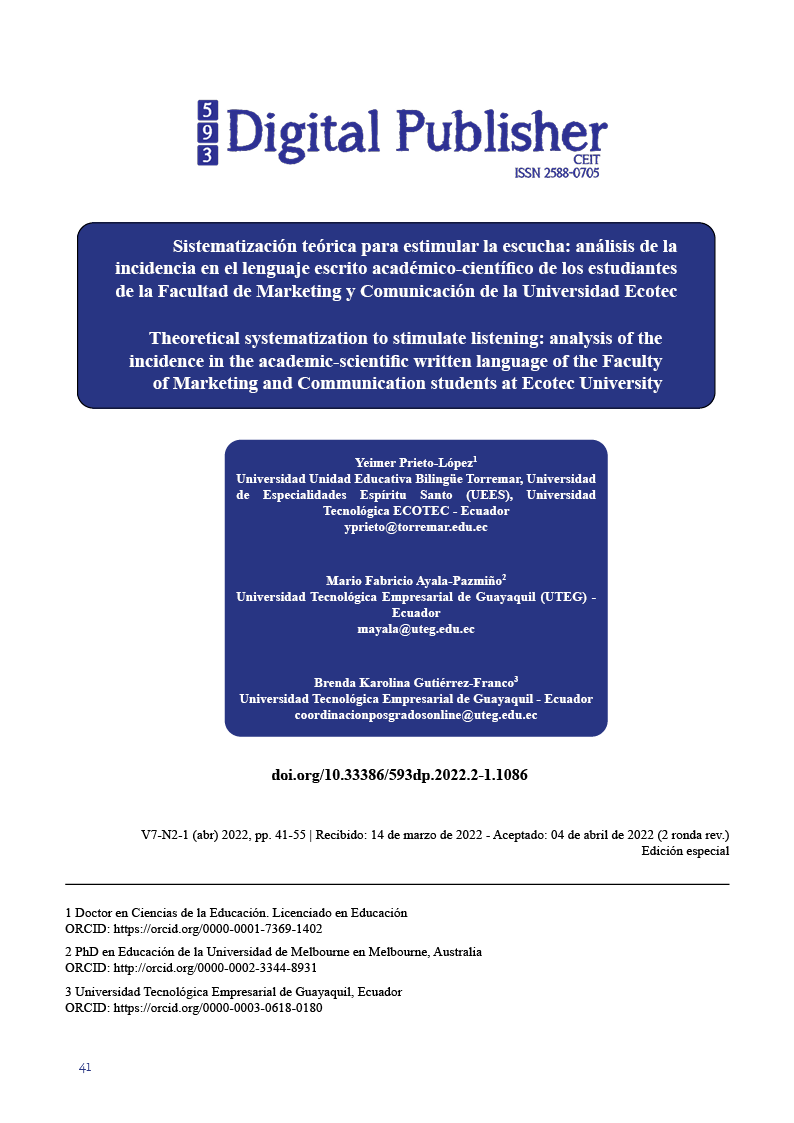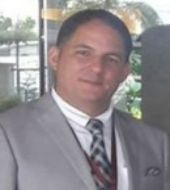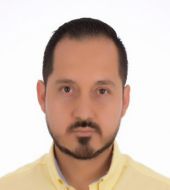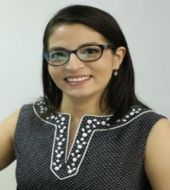Theoretical systematization to stimulate listening: analysis of the incidence in the academic-scientific written language of the Faculty of Marketing and Communication students at Ecotec University
Main Article Content
Abstract
Nowadays, written communication is fundamental in the university context, not only in expressing ideas and information that have involved social, academic, research, and scientific transformations, but it is also the basis of the knowledge society. Therefore, in the present research, we propose a general objective to carry out a theoretical systematization to stimulate listening: Incidence in the academic-scientific written language of the Faculty of Marketing and Communication students at Ecotec University.
It is qualitative-quantitative research where theoretical methods prevail. Such methods include the historical-logical for determining the main theoretical and methodological assumptions. Also, observation and surveys were applied. For the research development, a population of 300 students and a sample of 200 students taking the subjects of Research Methodology and Design of Research Projects were used.
In the academic field, the need for teachers and researchers to use written language appropriately and precisely This paper makes a critical analysis of the importance of written language, the relevance of listening to produce academically and scientifically, as well as the main characteristics of listening in the process of writing academic-scientific texts.
Downloads
Article Details

This work is licensed under a Creative Commons Attribution-NonCommercial-ShareAlike 4.0 International License.
1. Derechos de autor
Las obras que se publican en 593 Digital Publisher CEIT están sujetas a los siguientes términos:
1.1. 593 Digital Publisher CEIT, conserva los derechos patrimoniales (copyright) de las obras publicadas, favorece y permite la reutilización de las mismas bajo la licencia Licencia Creative Commons 4.0 de Reconocimiento-NoComercial-CompartirIgual 4.0, por lo cual se pueden copiar, usar, difundir, transmitir y exponer públicamente, siempre que:
1.1.a. Se cite la autoría y fuente original de su publicación (revista, editorial, URL).
1.1.b. No se usen para fines comerciales u onerosos.
1.1.c. Se mencione la existencia y especificaciones de esta licencia de uso.
References
Bloomfield, L. (1973). Linguistic Aspects of Science (10th ed.). Madrid: España Editions Workshop, Josefina Betancor.
Cisneros-Estupiñán, M. (2012). Linguistic Aspects of Science (10th ed.). Madrid: Editions Workshop.
Cloke, K. (1989). Systems Design for Conflict Resolution. Havana: University of Havana.
Cuervo, A. C. (2017). Communication skills in conflict resolution in the classroom. Pereira: Technological University of Pereira.
Escallon, E. (2017). Listen, understand and improve relationships. Altablero, the newspaper of a country that educates and educates itself. Barcelona: Universidad autónoma de Barcelona.
Fachelli, P. L. (2015). Methodology of quantitative social research. Barcelona: Autonomous University of Barcelona.
Fernández., R. V. (2019). Personal skills for family life. Spain: School of well-being.
Franco, L. P. (2014). Assertive behavior as a social skill. Ministry of Labor and Social Affairs of Spain.
Fernández-Fastuca, L., & Bressia, R. (2019). Definitions and characteristics of the main types of text. Faculty of Psychology and Education. Education Department.
Henao, J., & Castañeda, L. (2001). Reading in Higher Education: results of an investigation. Medellín: University of Antioquia.
Mendieta, B. A. (2016). Assertive communication: a pedagogical tool to develop communicative competence. Bogotá: National Pedagogical University.
Mendieta, B. A. (2016). Assertive communication pedagogical tool to develop communicative competence. Bogotá.
Monsalve, M. E. (2019). Development of communication skills in the new school. Medellín: Education and Pedagogy Magazine.
Montaño-Garfias, E. (2018). Speeches to promote democracy.
Morales, M. J. (2016). Languages and specialized common knowledge. Interam Magazine. Bibliot. Medellín (27).
Moreno, F., Marthe, N., & Rebolledo, L. A. (2010). How to write academic texts according to international standards. Barranquilla: Uninorte.
Pérez, J. (2007). From writing to hypermedia: the new communicative competence. Signs, theory and practice of education.
Ortiz, R. (2017). Learning to listen How to develop active listening skills. USA: Lulu.
Quijano, A. M. (2017). Communication skills in conflict resolution in the classroom. Pereira: Technological University.
Quiñonez., L. M. (2018). Methodological strategy to improve listening in students. Florence: University of the Amazon.
Rivas, T. L. (2014). How to do a Master’s thesis? Mexico: Open Workshop Editions.
Sanabria, M. (2016). Assertive communication in the construction of critical thinking. experience with sixth grade students in San Antonio Norte. Manizales: Autonomous University.
Sampieri, R. H., Fernández-Collado, C., & Baptista-Lucio, P. (2010). Investigation methodology. Mexico: McGraw-Hill.
Salazar-Duque, A. (2020). The writing: concept, characteristics, its phases. UAM Xochimilco.
Sánchez-Upegui, A. A. (2009). Scientific and literary writing: communicating the novelty of the world. Virtual Magazine Universidad Católica del Norte (28).
Silva-Camarena, J. M. (2020). Science: a matter of words. Accounting and Administration Magazine (212).
Terán, D. E. (2016). Development of assertive communication social skills to strengthen school coexistence. Bogotá: Free University.
Tohaira, M. (2010). The Art of Investigating. In S. Castro, & A. Marcos, Art and science: convergent world (pp. 326-333). Spain: Plaza y Valdés, S.L.
Van Dijk, T. A. (2003). The discourse as structure and process. Studies on discourse I. An interdisciplinary introduction. The study of discourse.




